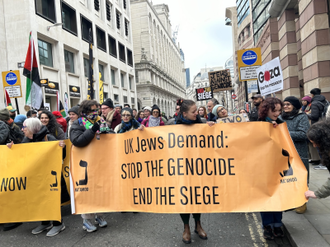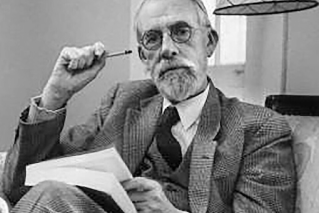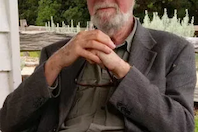Ian Linden: Genocide - Speaking Truth to Power

Hope and joy are wonderful gifts. The hostage crisis ends, the endless bombing and killing in Gaza stop. You would not think that Gaza had seen two previous ceasefires with exchanges of prisoners and captives and a brief flow of humanitarian aid.
Palestinians have bitter grief and unimaginable suffering to digest: both genocide and a new form of Middle East apartheid. The road to their future has been obliterated. There is no going back to their past, or, for most, their homes. Jews globally face a sharp rise in antisemitism, and in Israel the loss of 1,200 fellow citizens at Hamas' hands and, longer term, reduction of US support.
Forty years ago, at the height of mobilization against apartheid and repression in South Africa, theologians saw contemporary events as a Kairos, a critical moment, one of great opportunity and great danger. For Palestine now, the opportunity is to build on the weakness of Hamas and Trump's - fickle - pressure on Israel. The danger is accountability for genocide will be brushed under the negotiating table, the price for the peace-plan getting beyond phase one, a blow seriously undermining international law, possibly beyond repair.
In international law genocide has a precise definition. If genocide charges are legally proved then perpetrators can be, and are, charged. The former President of Serbia, Slobodan Milošević, for example, was prosecuted for genocide and war crimes but died in prison. There are consequences even without convictions. South Africa's 2024 complaint to the International Court of Justice, ICJ, resulted in International Criminal Court, ICC, arrest warrants for Hamas and three Israeli leaders. Netanyahu avoided the airspace of several European countries he should have flown over, en route to the UN General Assembly.
The UN Independent International Commission of Enquiry on the Occupied Palestinian Territory, 16 September 2025, provides a lengthy, detailed and evidence-backed analysis of the conduct of the Israeli government and its armed forces. Both proofs of actions and intention are needed to establish guilt of genocide So, the Commission's judgement is based both on detailed analysis of actus reus, actions by the IDF, mass killing, withholding the means of life from the Palestinian population in whole or in part, and inflicting serious physical and mental harm, and mens rea, evidence of the Government intention to commit genocide. The Enquiry's conclusion was: "the State of Israel bears responsibility for the failure to prevent genocide, the commission of genocide and the failure to punish genocide of the Palestinians in the Gaza Strip". It was put in the following context. "The events in Gaza since 7 October 2023 have not occurred in isolation... They were preceded by decades of unlawful occupation and repression under an ideology requiring the removal of the Palestinian population from their lands and its replacement".
The Vatican responds to human rights violations and conflicts wherever they occur. So what has the Catholic Church said about Gaza - where a tiny Christian population still cling on, made famous by Pope Francis' daily phone calls to Holy Family Church?
On 29 September 2025, Archbishop Paul Gallagher, Vatican Secretary for Relations with States, speaking at the opening of the 80th Session of the UN General Assembly, gave an informed global tour d'horizon including Ukraine, the Rohingya, Darfur, the Rwanda-DRC border area, Haiti, and South Sudan, plus a clear statement of the ethical norms governing the behaviour of soldiers in battle. He did not use the terms genocide or war crimes. But on Sunday, 17 November 2024, Vatican News and the Italian daily La Stampa had quoted Pope Francis in an interview as having said that some international experts had declared that "what is happening in Gaza has the characteristics of a genocide", and asking for this to be assessed.
Papal statements name no names and are traditionally generalised. In a message to participants in the annual Food and Agriculture Organisation (FAO) conference on 30 June this year, Pope Leo wrote how he was "currently witnessing with despair the iniquitous use of hunger as a weapon of war". Archbishop Gallagher in his speech to the UN General Assembly said "military personnel remain fully responsible for any violation of the rights of individuals and peoples, or of the norms of international humanitarian law. Such actions cannot be justified by obedience to orders from superiors". The IDF seemed likely to be the un-named military personnel they had in mind.
Caritas Internationalis is the Church's highly experienced official humanitarian body with a presence all round the world. It is rarely in the headlines. On 25 August 2025 Vatican News the official - on-line - portal of the Holy See carried an article entitled Caritas Internationalis: Famine in Gaza Violates Genocide Convention, an excoriating denunciation of the deliberate starvation of the Gazan population. Yet aside from Independent Catholic News, the Caritas statement has hardly been reported.
At the level of Bishops Conferences there is also reticence to attribute responsibility and talk of crimes against humanity and genocide. Engagement with public issues deemed political is tentative except for immigration (though American bishops have needed pushing by both Francis and Leo who recently sent them a letter asking them to speak out). In the case of Gaza, there is also the Church's history of antisemitism demanding sensitivity in dealing with extremist Zionism.
The Church sees its role in conflicts as advocating reconciliation, attempting mediation, thus taking up a position between the contending parties, not taking sides. And language has to be appropriate to the task. But the experience of the South African Dominican theologian, Albert Nolan OP in the exceptional situation of apartheid, challenged this approach. "There is no neutral place between the tortured and the torturer", he would say. The dilemma of Church leaders in such circumstances grows when there is reluctance to admit there are enemies. Or there is no clear idea of who or what is the enemy. Yet the language of the Magnificat, which we prayed at evening prayer at the Dominican priory in Johannesburg, is uncompromising and clearly takes sides. "He pulls down the mighty from their thrones and raises up the lowly".
Reconciliation is hard and complex. Easier to talk about in principle than practice. Reconciliation between, say, family members is different from reconciliation between nations and groups defined by different cultures, histories and characteristics. The other caveat, directly relevant and more often noted, is that a call for reconciliation can seem coercive unless concern for justice is integral to it, as traditionally advocated by the Church.
As well as preaching the Gospel and promoting ethical norms, the bishops reach out to share feelings, are "deeply shocked", or "saddened", with "hearts that go out to the victims". But, any analysis of root causes, who is responsible and must be made accountable, is rarely shared. Israel and its outsize American-funded military force has the power and wields it. A commitment to, and implementation of, a Christian understanding of power should not be curtailed by inveterate caution.
Unfortunately, in today's world "speaking truth to power" can damage the economy. But not so for the Church. Truth, justice, and peace, we owe this to the Palestinian people. Peaceful protest at the Gaza genocide and at the version of apartheid practised by the Israeli State has to continue.
Professor Ian Linden is Visiting Professor at St Mary's University, Strawberry Hill, London. A past director of the Catholic Institute for International Relations, he was awarded a CMG for his work for human rights in 2000. He has also been an adviser on Europe and Justice and Peace issues to the Department of International Affairs of the Catholic Bishops Conference of England and Wales. Ian chairs a new charity for After-school schooling in Beirut for Syrian refugees and Lebanese kids in danger of dropping out partnering with CARITAS Lebanon and work on board of Las Casas Institute in Oxford with Richard Finn OP. His latest book was Global Catholicism published by Hurst in 2009.
LINK
Ian Linden: www.ianlinden.com/latest-blogs/


















